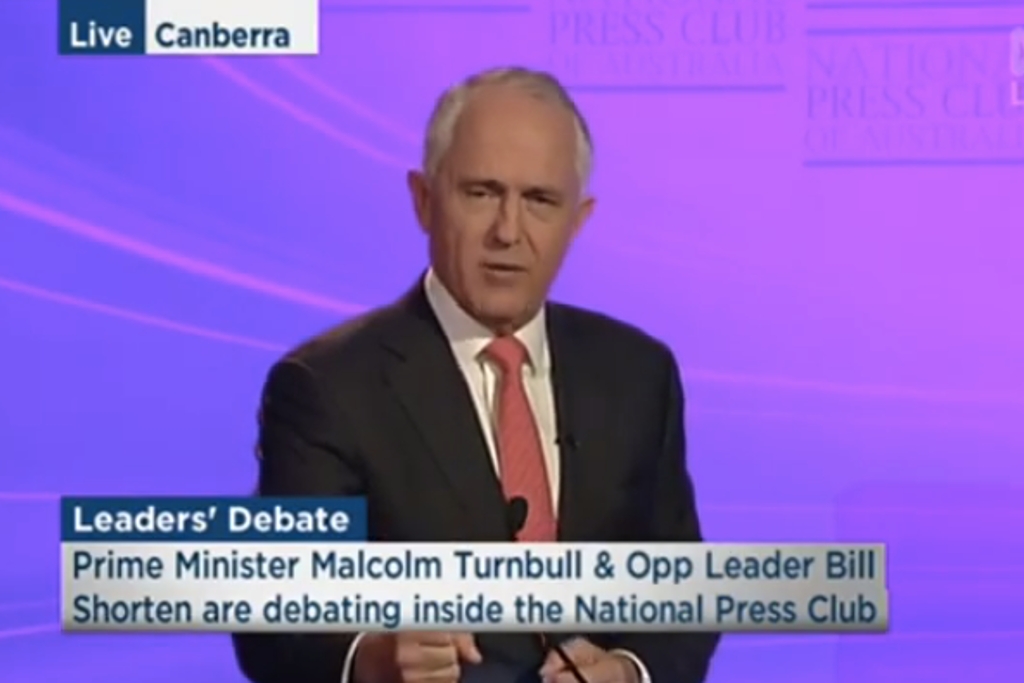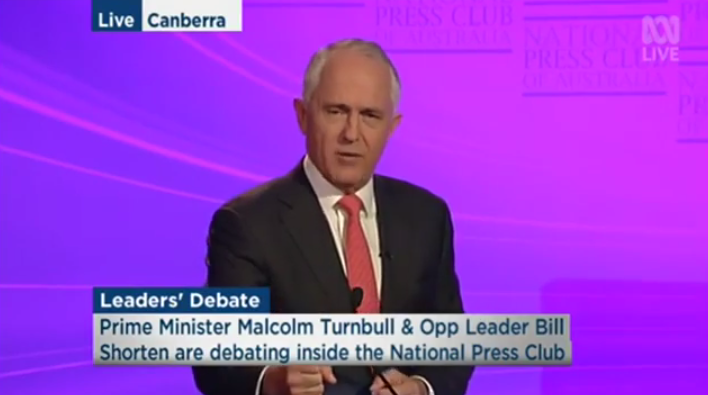So Who Won The Second Leaders’ Debate Between Malcolm Turnbull And Bill Shorten?
Let's face it - you were probably watching MasterChef.

The competitors were locked in an intense and furious contest. The stakes were high, nerves were rattled and a panel of learned experts peppered the challengers with a series of tough questions. Each of the contestants put forward something unique, exciting and visionary.
Sadly, I’m not talking about the Federal Election Leader’s Debate (which I forced myself to watch so you didn’t have to) but MasterChef (which in hindsight I wish I watched instead).
Tonight’s debate between Malcolm Turnbull and Bill Shorten was filmed by the ABC but made available to every other network. The fact that the commercial networks chose to run with The Princess and the Frog, re-runs of How I Met Your Mother and something called Martin Clunes And A Lion Called Mugi is a pretty strong indicator that they don’t think most voters are tuned into the election campaign yet.
It was the second official debate of the campaign so far, but considering the first one was broadcast exclusively on pay TV on a Friday night (why?) it’s the first time most people had the opportunity to watch Turnbull and Shorten go head to head, present their visions for the future and argue their respective policy platforms.
Or at least that’s the theory.
The debate was hosted by the National Press Club in Canberra, who decided, for some reason, that Turnbull and Shorten needed a spectacular shade of fuchsia as their backdrop. The pretty backdrop ended up being one of the most exciting things about the whole debate.

Fuchsia … so hot right now.
To kick things off, both leaders were given the opportunity to make opening statements and outline their basic election pitch. If you’d been following the campaign there wasn’t much new, and if you weren’t following the campaign you were probably too sensible to watch the debate.
–
‘Jobs And Growth’ Vs ‘Growth With Fairness’
Turnbull opened proceedings by declaring “We live in remarkable times”, which is actually a much more muted version of his more common phrase, “There’s never been a more exciting time to be an Australian.” Why the back down? He never explained.
Turnbull went on to talk about the important of jobs and growth as well as the importance of growth and jobs. The government’s priority, he said, was to focus on the future and deliver a strong economy.
Prime Minister @TurnbullMalcolm‘s opening statement at #leadersdebate #auspol #ausvotes https://t.co/DukrhrVPM6
— ABC News (@abcnews) May 29, 2016
Shorten, on the either hand, used his opening remarks to declare that this election was about who could focus “on the future and a strong economy”. To be fair, there were some interesting differences in both opening speeches. While they both focused heavily on the economy, Turnbull highlighted the Coalition’s plan to cut company tax and encourage investment in the private sector and new, ‘innovative’ industries.
Shorten instead chose to emphasise Labor’s commitment to health, education and “fairness”. He also attacked the Coalition for their “$50 billion hand out to big business”, arguing that the government should be prioritising investment in education rather than slashing tax rates for corporations.
Opposition Leader @billshortenmp‘s opening statement at the #leadersdebate #auspol #ausvotes https://t.co/IIrBIwWM7y
— ABC News (@abcnews) May 29, 2016
–
Will The ‘Real’ Malcolm Please Stand Up
The first actual question came from the Australian Financial Review’s Laura Tingle, and it was a corker. Tingle asked how Turnbull responded to allegations that he was a disappointment in the eyes of many voters, who had expected more from him but ended up getting most of Tony Abbott’s policy agenda.
It was a fascinating question and went right to heart of many Australian’s are feeling towards Turnbull – a sense of high expectations rapidly being dashed. Turnbull responded by talking about his previous life in the business world and the fact that he had been married for 36 years.
congrats for being married #leadersdebate
— Bec Shaw (@Brocklesnitch) May 29, 2016
Tingle, fair enough, pointed out he hadn’t answered the question. The debate moderator, ABC Political Editor Chris Uhlmann, helpfully pointed out, “The question is about yourself, Prime Minister”. Turnbull replied “Very good..” and went on to talk about climate change. This exchange captured one of the most frustrating aspects of the debate, from both leaders. Each question as viewed as an opportunity to pull out the same old talking points rather than actually respond directly and honestly.
Let me answer your question with a vaguely related statement I prepared earlier #leadersdebate — Michael Roddan (@MichaelRoddan) May 29, 2016
More than half the debate focused on economic issues like tax cuts, dividend imputation (I don’t know what that is either), and changes to superannuation. While the issues themselves are incredibly important, the debate felt a bit phoney given how similar the policies of both parties are.
Both leaders confirmed that they want to reduce the amount of tax Australians pay, though would go about it in different ways. Both leaders said they wanted to increase health and education spending, but neither could clearly outline how they actually do that in the long term. The only major differences were around emphasis: Turnbull focusing on innovation and start-ups while Shorten said the word “fairness” a lot more.
RT if you love to talk retrospective superannuation ;) #leadersdebate
— Elle Hunt (@mlle_elle) May 29, 2016
–
Asylum Seekers
Andrew Probyn from The West Australian pivoted the debate away from economic issues by asking what Turnbull and Shorten would do about the 1600 asylum seekers currently indefinitely locked up in detention centres on Nauru and Manus Island.
Turnbull directly ruled out ever settling those asylum seekers in Australia and quoted Abbot’s “stop the boats” mantra (so much for “No more three word slogans”), reaffirming his support for harsh refugee policies. Shorten declared that “Whoever forms the government, there will be no change to policy. Labor has the same approach as the government to deterring people smugglers,” continuing the very uninspiring theme of “Me too!” running across the entire debate.
–
Climate Change
The final question was on the issue of climate change. This time it was Turnbull’s turn to claim that the Coalition’s policy was similar to Labor’s, except for the fact that Labor had a renewable energy target it had apparently not costed. Shorten responded by bemoaning the loss of the old, popular Malcolm Turnbull (does he really miss him though?) and accusing him of having the same policy agenda as Tony Abbott.
By the end of the debate it was pretty clear that Turnbull’s main opponent wasn’t Shorten, but the spectre of his own previous political views. While Shorten competently, if boringly, put forward Labor’s policies on a number of issues, Turnbull was tripped up a couple of times on apparent inconsistencies between his government’s policy agenda and his statements before he came Prime Minister.
This debate would have been totally different with James Mathison. — Oscar Coleman (@occer) May 29, 2016
–
So Who Won?
Well, no one. I don’t think it was a draw, I think both leaders lost. Neither really answered the questions they were asked, both looked like they were speaking a tight script and there was nothing vaguely exciting or visionary presented. Basically we weren’t given a solid reason to vote for either him.
Given there is still another FIVE WEEKS to go in the election campaign, there’s a good chance there will be further debates closer to polling day. If the parties announce more specific policies, we might end up with a more interesting, and useful, policy debate on important issues like housing, healthcare and education.
Until then it looks like we’ll have to put up with Turnbull’s “Growth and jobs” and Shorten’s “Growth with fairness”.
I definitely should have watched MasterChef instead.
–
You can watch the second leaders’ debate in full on ABC News’ Facebook page. Coverage starts from the 10-minute mark.
–
Osman Faruqi is a Sydney-based writer and broadcaster. You can follow him on Twitter at@oz_f